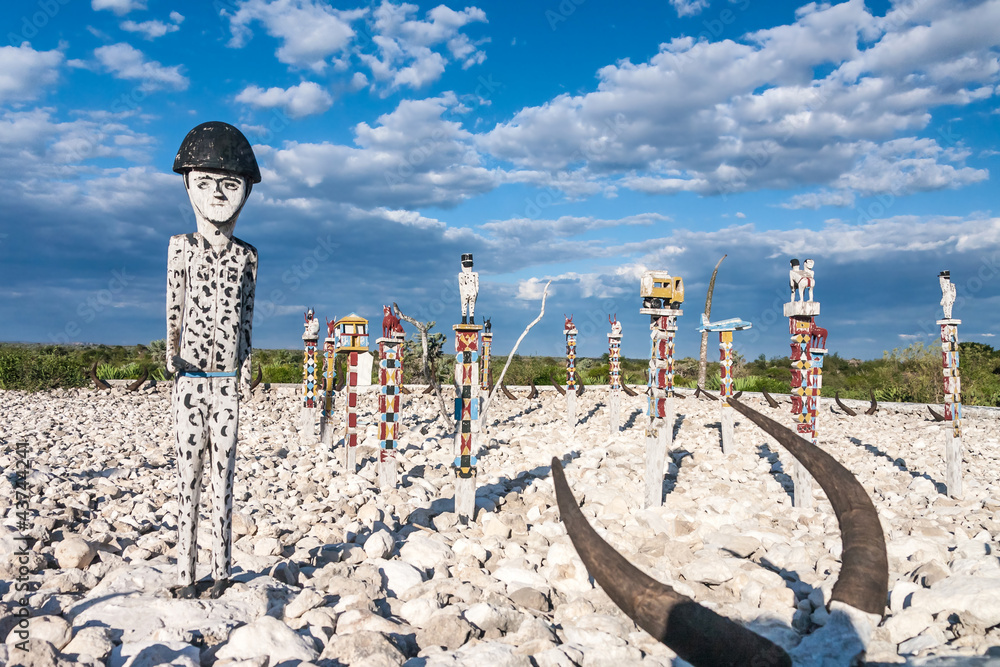The Mahafaly, who live on the limestone plateau in south-west Madagascar, are renowned for their fascinating traditions and rich and varied history.Living between the Menarandra and Onilahy rivers, they are one of the largest ethnic groups on the island, numbering around 247,000. Their unique way of life and customs are deeply rooted in Madagascar’s Austronesian history.
What does Mahafaly mean in Malagasy?
Fascinatingly, the term “Mahafaly” has several spelling variants depending on the source: Mahafalay, Mahafale, Mahafaley, Mahafali, Mahafalys, and Mehafaly. These variations illustrate the different ways in which the name has been spelled and pronounced over time by locals and researchers alike.
In Malagasy, “Mahafaly” means “those who make triumph” or “those who make victory”. These people are often described as formidable warriors. According to various legends, the word Mahafaly can also mean “who is taboo” or “who makes happy”, although the first meaning is considered the most likely. Still living in groups, their dialect derives from the languages spoken in Borneo.
The origin of the Mahafaly or even Malagasy culture :
Numerous multi-disciplinary studies, notably in archaeology, genetics, linguistics and history, all point to a common Austronesian origin for the Malagasy peoples. The first Austronesians, known as Ntaolo, reached Madagascar by outrigger canoe from the Indonesian archipelago around the beginning of our era. These navigators introduced cultural, linguistic and agricultural elements that still form the basis of contemporary Malagasy culture.
Lifestyle and culture :
The Mahafaly people live mainly from agriculture and livestock breeding, adapting their traditional techniques to the arid climatic conditions of their region. They are also famous for their tombs decorated with sculptures and frescoes, representing their rich cultural heritage. These tombs, decorated with colorful motifs and wooden statues, are seen as testimonies to the life and achievements of the deceased, underlining their importance within the community.
The diversity and integrity of the Mahafaly people :
Over the centuries, the Mahafaly have been in contact with various groups of merchants and migrants, including the Shirazi Persians, Omani Arabs and East African Bantus. These interactions enriched their culture while preserving their distinct identity. These exchanges are reputed to have contributed to the ethnic group’s cultural and linguistic diversity, incorporating outside influences while firmly preserving their ancestral traditions.
Mahafaly dialect and language :
The Mahafaly dialect is a variant of the Malagasy language, which belongs to the Austronesian Malayo-Polynesian language family. This language, which is common to the whole island, bears witness to the cultural and linguistic unity of the Malagasy people, although it also presents significant regional variations. Malagasy, with its many dialects, reflects the historical complexity and interactions between Madagascar’s various ethnic groups, as well as their diverse origins.
The Mahafaly through the ages: Between tradition and modernity :
The Mahafaly, like other ethnic groups in Madagascar, face modern challenges while preserving their ancestral traditions. Their agricultural and pastoral techniques have adapted to harsh environmental conditions, while firmly maintaining their immemorial beliefs and customs, testifying to exceptional cultural resilience. Like other ethnic groups in Madagascar, the Mahafaly are also confronted with the country’s lagging economic development, which hinders their expansion and poses a challenge between maintaining their traditions and embracing modernity.
With their rich history and traditions, the Mahafaly are a cornerstone of Madagascar’s cultural heritage. Their Austronesian origins, their historical interactions with various cultures, and their ability to navigate skillfully through modern challenges, embody a diversity and strength that profoundly enriches island society.
Source : L’écho du Sud : Nelly Rembert






